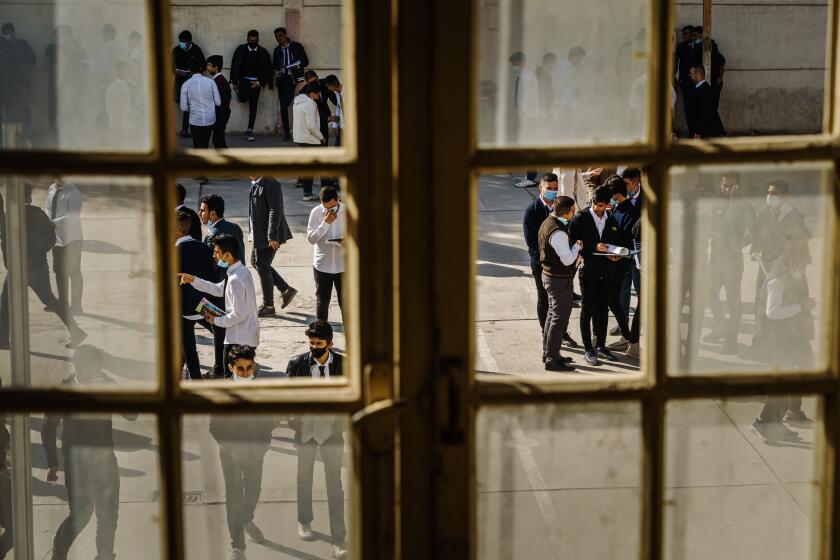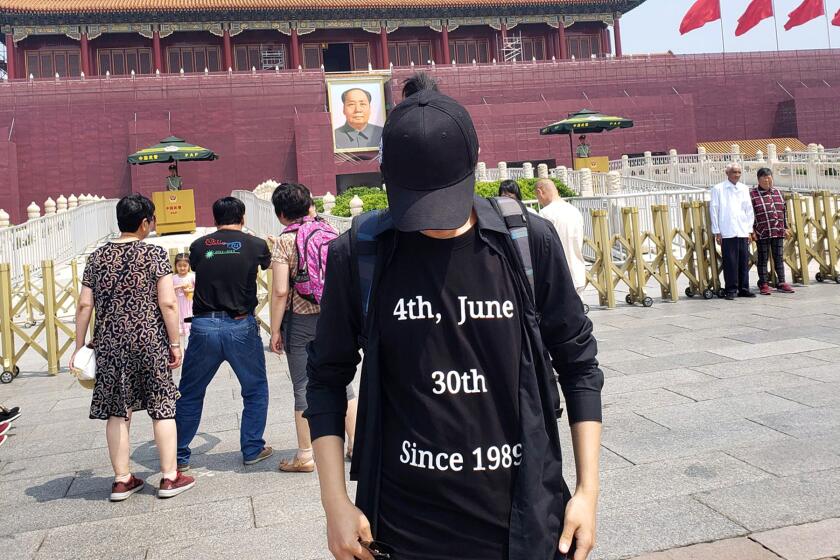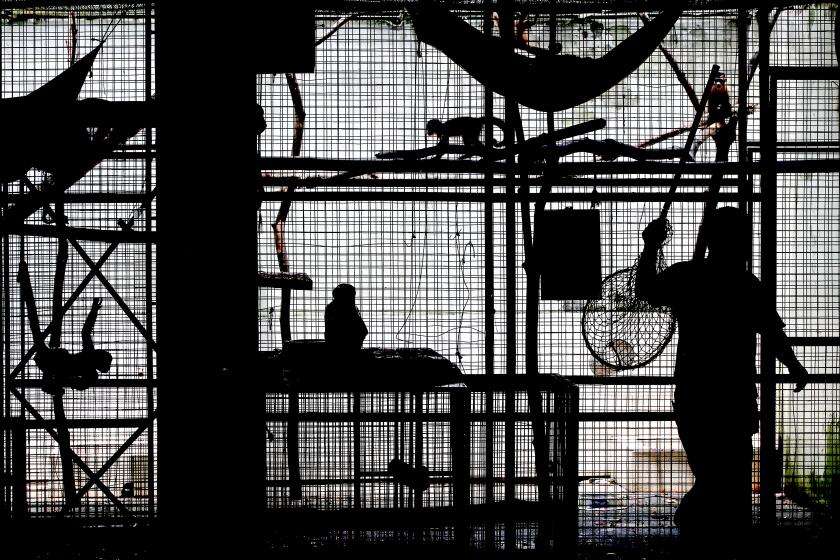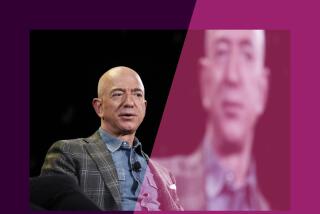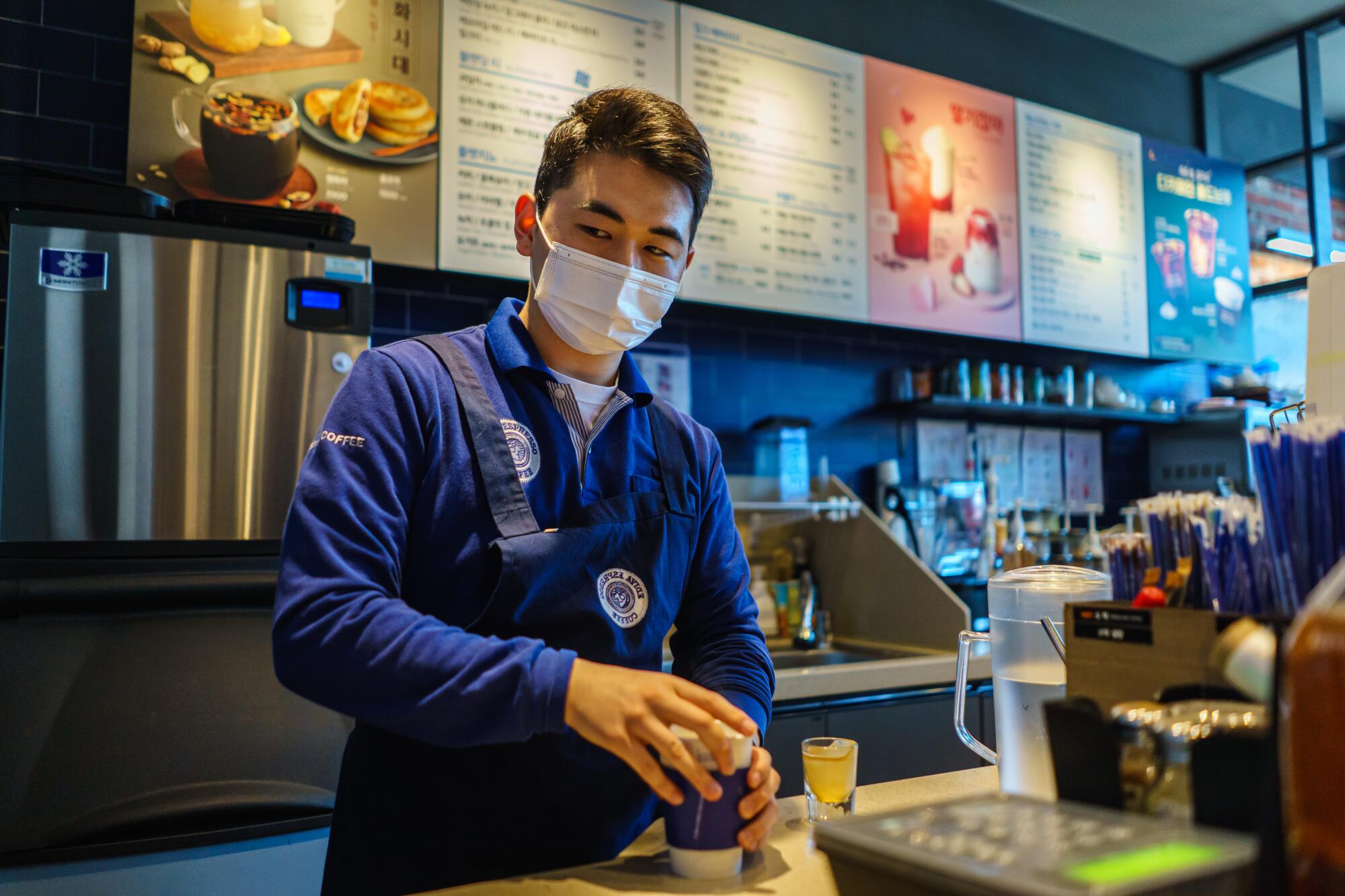
Jung Gyu-ho became an inventive young capitalist in the middle of a pandemic.
South Korea was confronting an emerging second wave of COVID-19 cases. An acquaintance of his father’s had pivoted his cosmetics factory to churn out face masks that were suddenly in huge demand. The man asked Jung, 23, who had recently quit his semiconductor factory job to go back to school, to set up an online direct-to-consumer sales operation.
Jung already had a tidy sum in the stock market and was collecting rent on an apartment unit he owned while living in the factory dorms or with his parents. Now, in just a month, the new mask business had racked up more than 400 million won in sales — about $350,000.
“Am I going to be rich?” he thought.
The COVID-19 pandemic has devastated economies and gutted jobs across the developed and developing world. The loss of economic opportunities has hit young people, more likely to be employed in precarious sectors and in tenuous positions with fewer years’ experience, far worse than older adults in stable jobs.
But the devastation hasn’t hit evenly. Although the unprecedented shutdown and economic disruptions have plunged much of the world’s poor youth into direr straits, for young people in privileged regions, the cataclysmic changes wrought by the pandemic have offered a rare chance for a jump-start or boost in entrepreneurship, investment and creativity. Much like COVID-19 vaccines — with rich nations already offering booster shots while poor ones have yet to provide most of their citizens a first shot — wealth and opportunity have never more clearly seemed a matter of geographic lottery.
The World They Inherit
This is the fourth in a series of occasional stories about the challenges young people face in an increasingly perilous world. Reporting was supported by a grant from the Pulitzer Center.
The very upper crust of the world’s wealthy have dramatically increased their fortunes while much of the globe suffered. Many have directly profited from the crisis, reaping profits in pharmaceuticals, testing and vaccines. Services such as Amazon, food delivery and streaming entertainment companies such as Netflix have seen an unprecedented surge in demand.
Combined with governments pumping money toward economic recovery, those trends have made the richest even richer. The ranks of the “ultra high net worth” individuals with more than $50 million to their name has increased by 24%, the highest increase in nearly two decades, according to this year’s Global Wealth Report by Credit Suisse. Billionaires have seen their wealth balloon by 69%, according to Oxfam.
In societies in East Asia, Europe or the U.S. with better safety nets, more robust fiscal policies and stronger employment protections, the young have suffered far less, and even managed to better their fortunes. Rich nations spent about $850 per capita on pandemic social protections, and low-income countries spent just $4, according to the World Bank.
“The youth that are able to take advantage of what’s happened or able to get a foothold in that economic recovery tend to be those who are educated, more likely to adapt, in occupations that allow for telework,” said Sher Verick, an economist at the International Labor Organization who is head of the group’s employment strategies unit. “In countries where there’s poor access to internet, weak infrastructure, it’s that much harder to take advantage.”
The disparate fortunes emerging from the pandemic foreshadow what’s likely to be, for today’s young adults, a lifetime defined by cascading crises in which prosperity may ebb and flow. With climate change, increasing migration, the widening reach of artificial intelligence and disruptions from cryptocurrencies, NFTs or whatever the next technological upheaval may be, wealth and work promise to be far more complex and tricky to navigate than for previous generations. The pandemic was their first crucible; it won’t be their last in an age when the young may often have to reinvent themselves.
Such anxieties over the future resonate in “Squid Game” — a South Korean TV series that has become a Netflix sensation in its Darwinian exploration of wealth gaps and struggles to survive even in a well-to-do nation. The show’s dystopian aura pits financially strapped characters against one another in a deadly competition — guns, a scary doll and tug-of-war over an abyss — to win millions of dollars. It speaks to accelerating inequalities and a realigning of the economic order as the young face narrowing chances of finding good-paying jobs and affordable homes, much less riches.
::
Jung has dreamed of becoming rich — in his words, “to make enough money to be disillusioned by capitalism” — ever since his family faced financial collapse.
When he was 13, his father’s cosmetics business went bust. For a year, he lived alone in an apartment where past-due rent snowballed as his parents moved around dodging debt collectors. Because of his family’s predicament, he gave up on college early, choosing to attend a specialized job-training high school. At 18, he started working at a Samsung semiconductor factory, pulling swing shifts in head-to-toe cleanroom suits that would leave him drenched in sweat at the end of the workday.
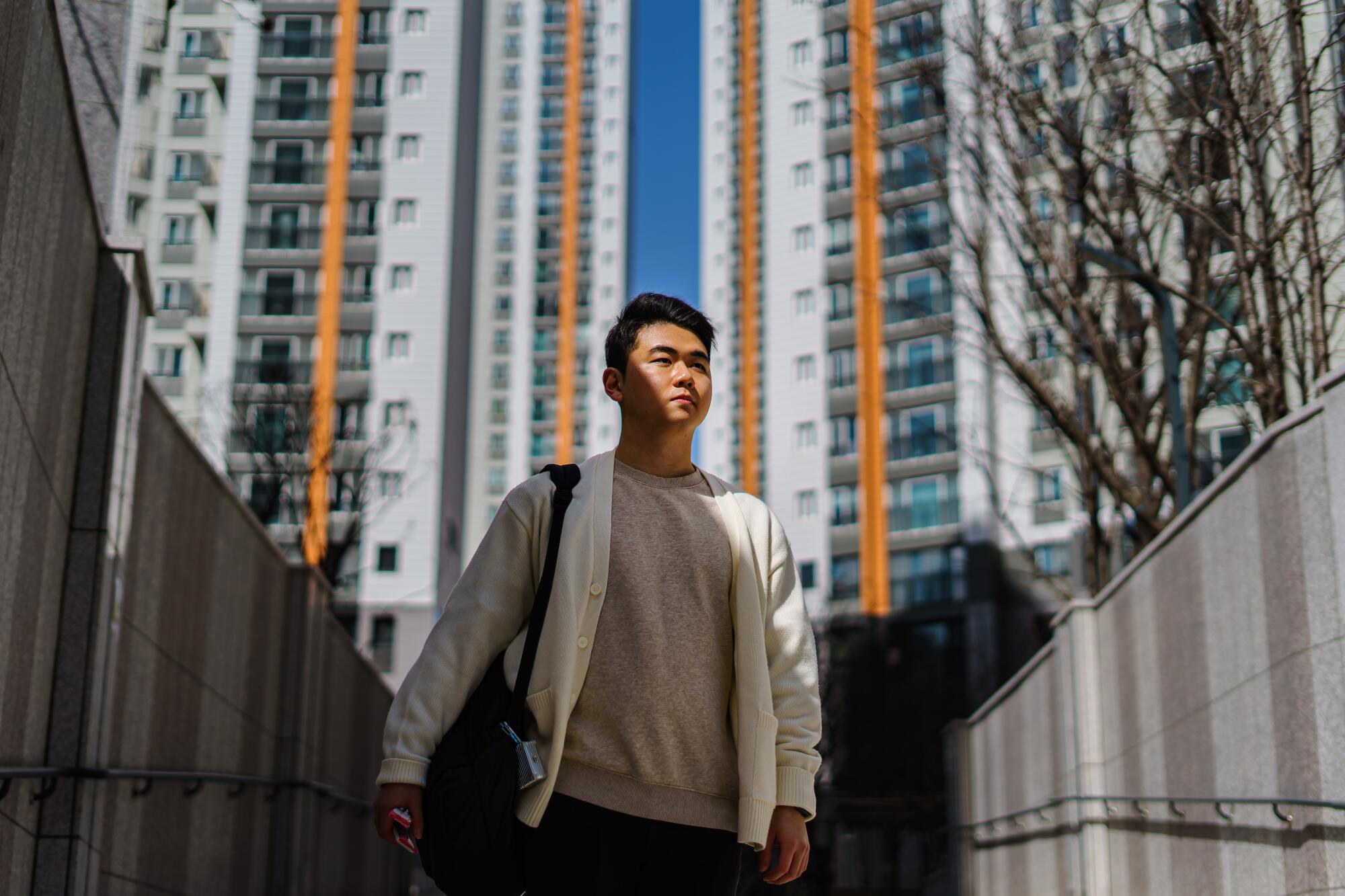
The $60,000 or so in starting salary was an enviable sum, nearly double the average annual salary for South Korea. But he wasn’t satisfied with just drawing an income; he wanted to develop other streams of cash flow to multiply his wealth. He started an online drop shipping business importing and selling women’s clothing and sex toys from China, bringing in a couple of thousand a month. He began growing his investments in the stock market.
At the beginning of 2020, though, Jung wanted to take a breather. He quit his job, wound down his online business and decided to go back to school.
Then the pandemic hit, and the capitalist ambitions he was planning to put on hold were sent into hyperdrive.
When the economic uncertainties around the pandemic led to a steep market crash early last year, then quickly began recovering just as sharply, young adults in South Korea flocked to retail investing in unprecedented numbers. No longer seeing a solid future or growth in traditional employment the way their parents did, many began taking out massive loans to go all in on the stock market. “Scrape together everything, including your soul,” became the credo for many young investors.
Jung took out 40 million Korean won, about $35,000, in loans to add to his stock market investments.
Around the same time, he launched the online mask sales business. South Korea saw a run on masks in the first months of the pandemic, to a degree where the government rationed sales to two per person per week. Jung began selling them about the time the country’s second wave hit. Sales were highest that first month and settled at a lower level, but they became a steady stream of income, earning him several thousand dollars each month with minimal effort.
Since the pandemic, Jung estimated, his net worth has grown by about 50%, even though he hasn’t been working. Some of his friends raked in much more — by investing in bitcoin or real estate, with far more dramatic price fluctuations, he said. A couple of friends his age who went all in on the real estate market are now worth between a million or two, he said.
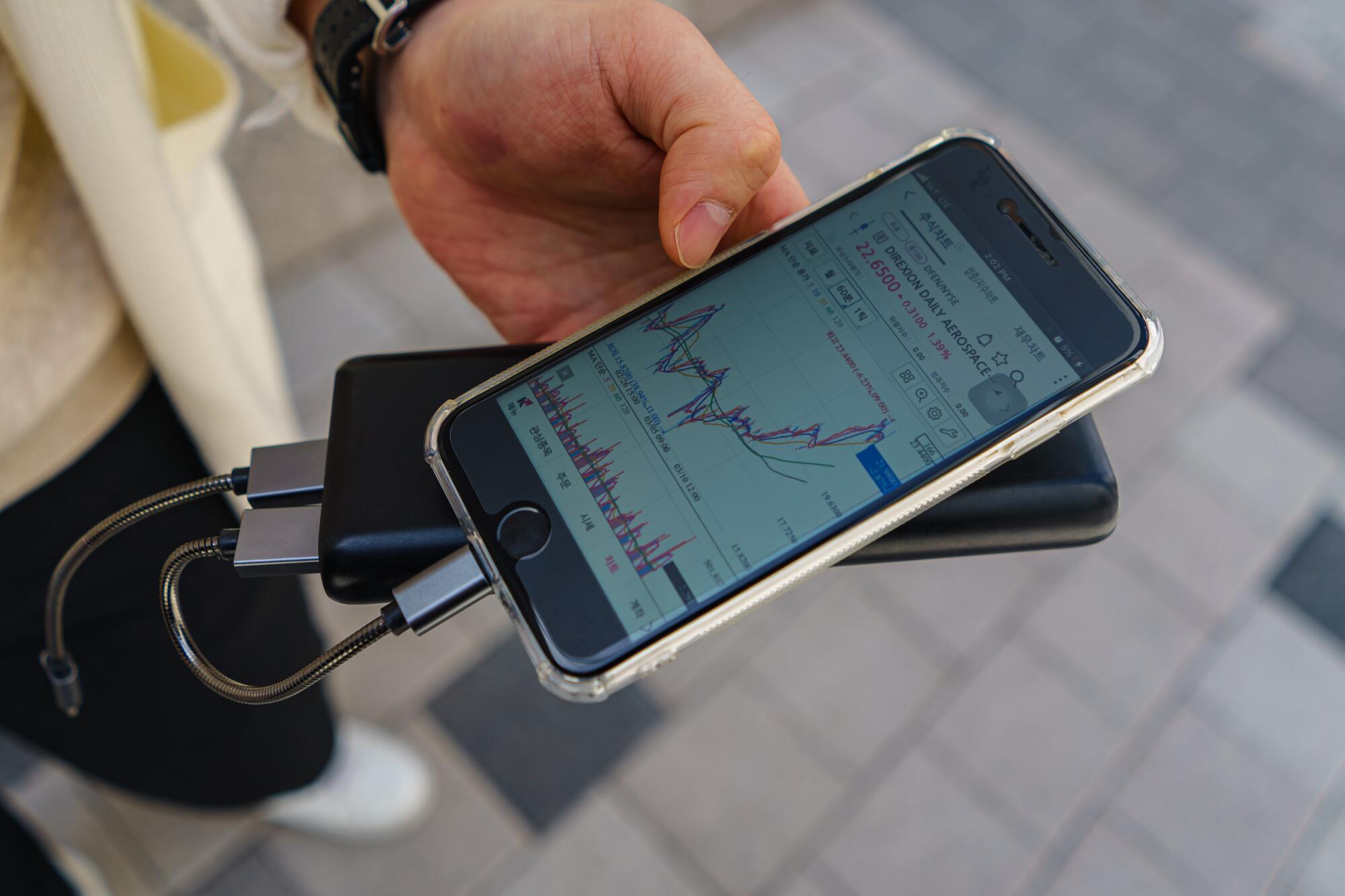
“I think there’s always opportunity in change,” he said. “The rich getting richer and poor getting poorer, it’s definitely worse for those of us now in their 20s and 30s than the generation before us.”
The gap opened up by the pandemic may end up being impossible to bridge over their lifetimes, he said, comparing his lot with that of his peers who chose to go to college, and didn’t have the seed capital to take advantage of the stock market rally.
“The gulf is incredibly wide,” he said. “I’m not sure an opportunity like this will ever come again.”
::
While Jung’s fortunes were being buoyed by the market crash and the mask frenzy, the global run on toilet paper was shaping up to be a godsend for Oliver Elsoud’s young business in Germany.
The 37-year-old had quit his day job in 2016 and invested his savings, about 60,000 euros, into a startup making a product that he and his partner called “Happy Po” — “Happy Rear End.”
The brightly colored 11-inch-tall squeeze bottle shoots up a stream of water. The invention was born when Elsoud experienced the benefits of using water rather than toilet paper while traveling the Middle East and Asia for a German tool and electrical supplies company. It seemed to be a far more hygienic, convenient and eco-friendly alternative to toilet paper, and going back to wiping each time he returned home felt like regressing to the dark ages.
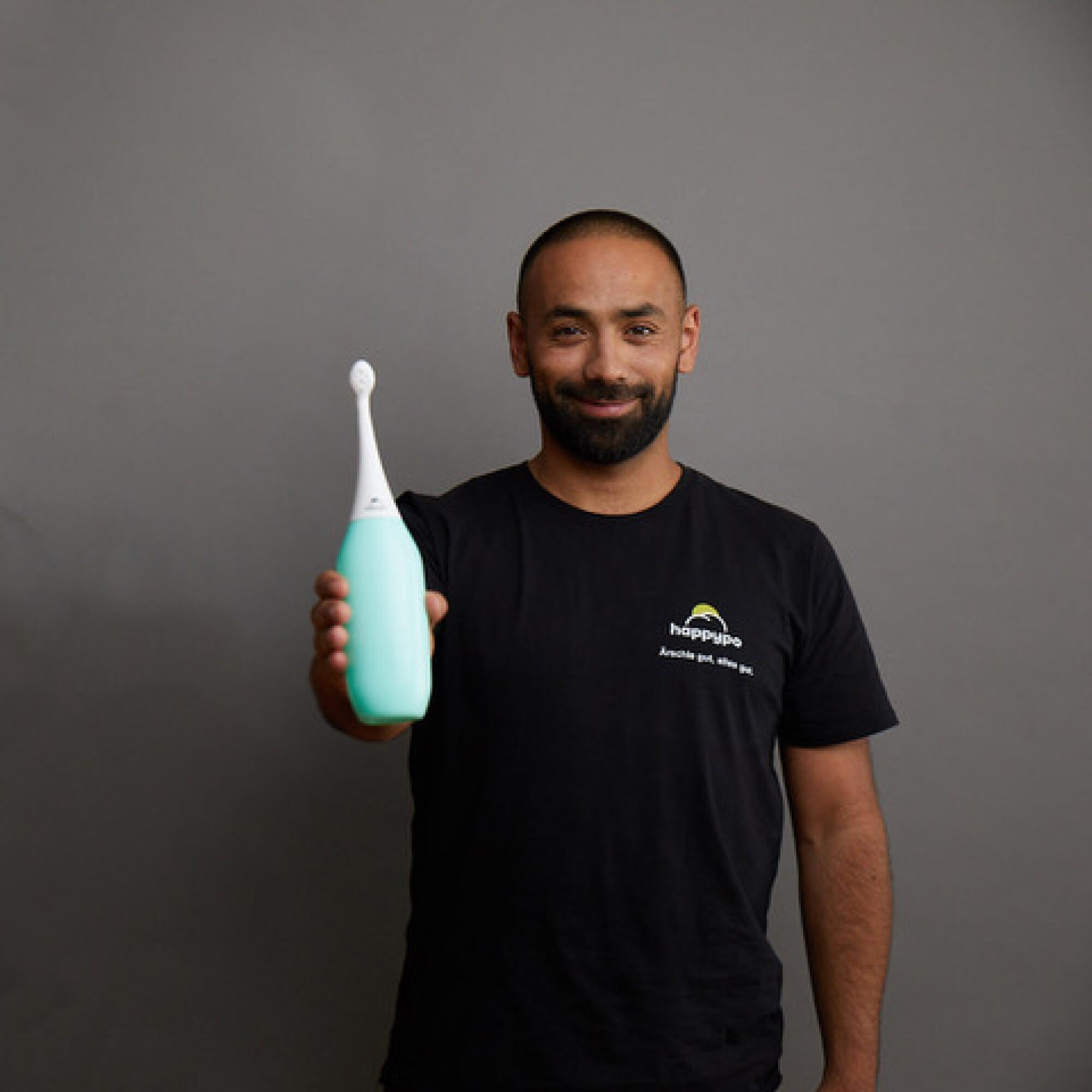
Elsoud’s company slowly gained traction after a publicity boost from a German version of the investment pitch reality TV show “Shark Tank” — called “Lion’s Den” — in 2017. But bathroom habits, he found, die hard. Germans are heavy toilet paper consumers, using more per capita than most developed nations, second only to the U.S., using about 33 pounds per capita per year.
Last year, as countries began shutting down after the onset of the pandemic, toilet paper sold out quickly in panic buying. The makers of “Happy Po” — also marketed as “bum shower” — were poised to step in to offer an alternative. Sales of the device quickly rose tenfold within a few short weeks, to more than 100,000 devices sold per month.
“The coronavirus took us to the next level,” Elsoud said. “Corona changed everything for us. Everything took off overnight. Demand went through the roof. We touched the era’s nerve.”
This February, a little over four years after he launched his start-up, he sold the company for “several million euros” to a larger firm.
Elsoud doesn’t think of himself as a “Krisengewinnler” — German for “crisis profiteer” — but simply thinks he was ready when the stars aligned and a once-in-a-lifetime opportunity opened up.
“Things certainly went our way. Sure, we were lucky, but so were other online businesses,” he said. “You just can’t plan something like that happening. It’s all about the timing.”
He grew up in a solidly middle-class household of Palestinian immigrants in southwest Germany. His father worked for the German carmaker Daimler-Benz, affording the family the comfort and security of the country’s stalwart auto industry. Elsoud started out working for a German tool and electrical supplies company but became enticed by the promise of Friedrichshain, the once-gritty neighborhood of Berlin that has become a hotbed of innovative start-ups.
He remains at the company after the sale as senior brand manager. Even beyond the pandemic, he feels optimistic that the business will continue to burgeon — especially in the toilet-paper-loving U.S., where he sees a broad horizon for growth, especially among environmentally conscious consumers.
“There are so many arses out there so the potential is enormous,” he said. “We haven’t come close to seeing the full potential tapped yet.”
::
If Elsoud was well-positioned to take advantage of the run on toilet paper, for Daniel Thrasher in Los Angeles, it was people’s confinement to their homes in the early days of the pandemic that proved a boon.
In early 2020, it had been a year since the actor quit his day job working at a coffee shop on La Brea Avenue to focus full time on his YouTube channel, featuring comedic sketches he writes and performs, often accompanied by his piano compositions. He’d grown his channel to a million subscribers, and secured sponsorships that ensured he’d be able to make a steady income.

Before the pandemic, he’d been planning a move to a quiet town house near the L.A. River to isolate himself and focus on his comedy. The stay-at-home order that went into effect in March 2020 reinforced that isolation and allowed the then-27-year-old to have some of the most creative months of his life. He improvised nonstop and introduced a number of new characters to his videos, including a singing Satan, a songwriting cat and personified procrastination.
At the same time, as people were being forced to spend much of their time indoors and looking for distractions, his subscribers nearly tripled to 2.7 million. His income jumped by a similar proportion. Other online content creators he spoke to saw similar increases. In 2020, 81% of Americans said they use YouTube, up from 73% in 2019, according to Pew Research Center. Among Thrasher’s contemporaries, young adults aged 18 to 29, 95% said they use the service.
His sponsors, who he worried would be scaling back, seemed even more eager to renew their contracts with him at higher rates.
“There was more budgeting redirected toward the internet,” he said. “The pandemic reinforced for everyone that the internet is where you want to spend your marketing dollars. They were scrambling to find creators to give these funds to.”
It was since COVID-19 that the wiry and moppy-haired performer with a cheeky grin started being recognized on the street once or twice a week. He went from a one-person operation to a four-person team, hiring creative assistants and an editor to help run his channel. In July, he bought a $2.1-million Studio City home; this year, he anticipates he’ll make more than a million for the first time, he said.
Because his parents are both healthcare workers, risking their own lives to save others during the pandemic, he struggled emotionally when he started earning more than them, he said.
He also knows the landscape of his industry is fickle. The pandemic minted a host of TikTok stars making short videos in their bedrooms. When the stay-at-home orders lifted earlier this year and vaccines started becoming more widely available, Thrasher, along with other YouTubers, saw their numbers slide.
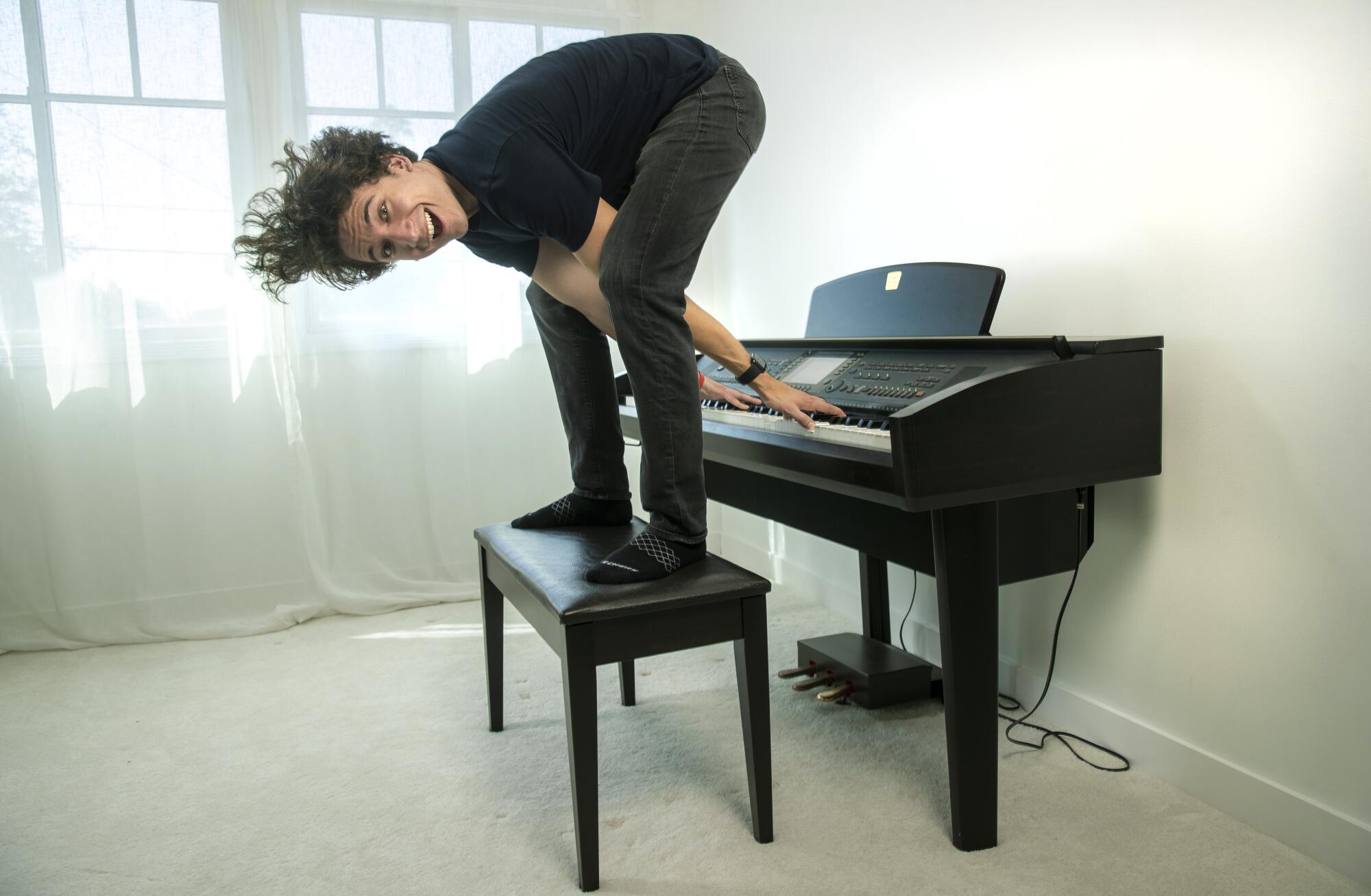
“There’s a lot more competition.... there’s an ocean of people arriving on YouTube,” he said. “They’re coming to take over. I’m working as if I’m waiting for someone to take me down.”
::
Jung, now 24, doesn’t know how rich he’ll be in the future. But he’s mapping it out. He moved to Pleasant Hill in California in August to continue college studies he’d started online. He bought a used Nissan Altima, and is paying for his education and living expenses through his mask sales income.
He’s studying business administration, building on his experiences having run small sales operations and investing. He wants to work in consulting before eventually running his own businesses — he’s not sure in what but knows he doesn’t want to be working for anyone else.
In the U.S., he has also encountered friends with a different degree of wealth. Two fellow students he met in his first weeks came from families with private jets. The pandemic, he said, had the effect of teaching him just how quickly the gulf between haves and have-nots is widening.
“I’m not sure I really realized before, money makes money,” he said. “I think I understand capitalism a little better now.”
Kim reported from Seoul and Kirschbaum from Berlin.
(This is the fourth in a series of occasional stories about the challenges the young face in an increasingly perilous world. Reporting for the series was supported by a grant from the Pulitzer Center on Crisis Reporting.)
More to Read
Start your day right
Sign up for Essential California for news, features and recommendations from the L.A. Times and beyond in your inbox six days a week.
You may occasionally receive promotional content from the Los Angeles Times.

